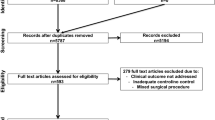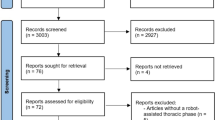Abstract
Background
Esophageal squamous cell cancer (ESCC) is mostly diagnosed in its later stages, when patients present with dysphagia and weight loss. Esophageal dilation with percutaneous endoscopic gastrostomy (PEG) is a common surgical procedure in patients with locally advanced ESCC because of tumor obstruction and enteral nutrition support during neoadjuvant or definitive concurrent chemoradiotherapy (CCRT). Esophageal dilation with PEG is widely performed under general anesthesia (GA) with endotracheal intubation.
Aim of the study
To determine the overall success rate of completing this procedure using intravenous (IV) sedation with dexmedetomidine (DEX) relative to GA and to compare its perioperative conditions, including procedure times, pain scores (visual analog scale), adverse events, and costs.
Settings
Songklanagarind Hospital, Faculty of Medicine, Prince of Songkla University, Thailand.
Patients and methods
Prospective randomized controlled trial (RCT) of locally advanced ESCC patients who had dysphagia and needed esophageal dilation with PEG between January 2020 and December 2021. Esophageal dilation (using a Savary-Gilliard dilator) and PEG were performed using the pull technique.
Results
Seventy patients were randomly assigned to either the DEX group (n = 34) or the GA group (n = 36). All patients in both groups underwent successful surgery. The DEX group had a significantly shorter procedure time, lower procedure cost, and lower total hospital cost than the GA group. However, there were no significant between-group differences in pain scores or length of hospital stay. There were no serious adverse events in either group; however, the GA group had some incidences of sore throat, transient hoarseness, and atelectasis.
Conclusion
This study found that IV sedation with DEX during esophageal dilation with PEG was as effective and safe as using GA.


Similar content being viewed by others
References
Ferlay J, Colombet M, Soerjomataram I, Mathers C, Parkin DM, Piñeros M, Znaor A, Bray F (2019) Estimating the global cancer incidence and mortality in 2018: GLOBOCAN sources and methods. Int J Cancer. https://doi.org/10.1002/ijc.31937
Zhao X, Lim F (2020) Lifestyle risk factors in esophageal cancer: an integrative review. Crit Care Nurs Q. https://doi.org/10.1097/CNQ.0000000000000295
Rice TW, Patil DT, Blackstone EH (2017) 8th edition AJCC/UICC staging of cancers of the esophagus and esophagogastric junction: application to clinical practice. Ann Cardiothorac Surg. https://doi.org/10.21037/acs.2017.03.14
Mellow MH, Pinkas H (1985) Endoscopic laser therapy for malignancies affecting the esophagus and gastroesophageal junction. Analysis of technical and functional efficacy. Arch Intern Med 8:1443–1446
Chapman CR, Casey KL, Dubner R, Foley KM, Gracely RH, Reading AE (1985) Pain measurement: an overview. Pain 1:1–31
Joshi P, Yadav R, Dangi A, Kumar P, Kumar S, Gupta V, Gupta V, Chandra A (2020) Corrosive esophageal strictures: from dilatation to replacement: a retrospective cohort study. Dysphagia. https://doi.org/10.1007/s00455-019-10058-1
Jung SO, Moon HS, Kim TH, Park JH, Kim JS, Kang SH, Sung JK, Jeong HY (2022) Nutritional impact of percutaneous endoscopic gastrostomy: a retrospective single-center study. Korean J Gastroenterol. https://doi.org/10.4166/kjg.2021.086
Kamibayashi T, Maze M (2020) Clinical uses of alpha2 -adrenergic agonists. Anesthesiology. https://doi.org/10.1097/00000542-200011000-00030
Bong CL, Tan J, Lim S, Low Y, Sim SW, Rajadurai VS, Khoo PC, Allen J, Meaney M, Koh WP (2019) Randomised controlled trial of dexmedetomidine sedation vs general anaesthesia for inguinal hernia surgery on perioperative outcomes in infants. Br J Anaesth. https://doi.org/10.1016/j.bja.2018.12.027,May5,2019
Carollo DS, Nossaman BD, Ramadhyani U (2008) Dexmedetomidine: a review of clinical applications. Curr Opin Anaesthesiol. https://doi.org/10.1097/ACO.0b013e328305e3ef,Aug4,2008
Acknowledgements
We would like to thank Dr. Alan Geater and Ms. Walaluk Jitpiboon, Department of Epidemiology, for the statistical analysis. Mr. David Patterson, International Affairs Unit, Faculty of Medicine, Prince of Songkla University, reviewed the manuscript.
Funding
This project was funded by the Faculty of Medicine, Prince of Songkla University, Thailand, PSU 61–368-10–1 grant to S.S.
Author information
Authors and Affiliations
Corresponding author
Ethics declarations
Disclosures
The authors: Dr. SS, Dr. PB, Dr. OK, Dr. KY, Dr. SR, Dr. SL, and Ms. OC: declare no conflicts of interest or financial ties to disclose.
Ethical approval
This study was performed in accordance with the principles of the Declaration of Helsinki. Written informed consent was obtained from all patients. IRB approval was obtained from the Faculty of Medicine, Prince of Songkla University Review Board (REC.61–368-10–1). The trial was registered with the University Hospital Medical Information Network UMIN Clinical Trials Registry (UMIN000038996). The study was conducted according to the CONSORT 2010 guidelines and checklists.
Additional information
Publisher's Note
Springer Nature remains neutral with regard to jurisdictional claims in published maps and institutional affiliations.
Rights and permissions
Springer Nature or its licensor (e.g. a society or other partner) holds exclusive rights to this article under a publishing agreement with the author(s) or other rightsholder(s); author self-archiving of the accepted manuscript version of this article is solely governed by the terms of such publishing agreement and applicable law.
About this article
Cite this article
Sunpaweravong, S., Benjhawaleemas, P., Karnjanawanichkul, O. et al. Randomized controlled trial of intravenous sedation vs general anesthesia for esophageal dilation with percutaneous endoscopic gastrostomy in esophageal cancer patients. Surg Endosc 37, 5109–5113 (2023). https://doi.org/10.1007/s00464-023-09984-x
Received:
Accepted:
Published:
Issue Date:
DOI: https://doi.org/10.1007/s00464-023-09984-x




